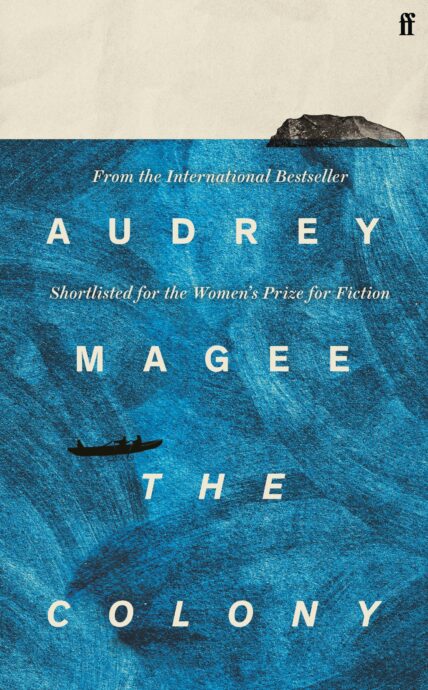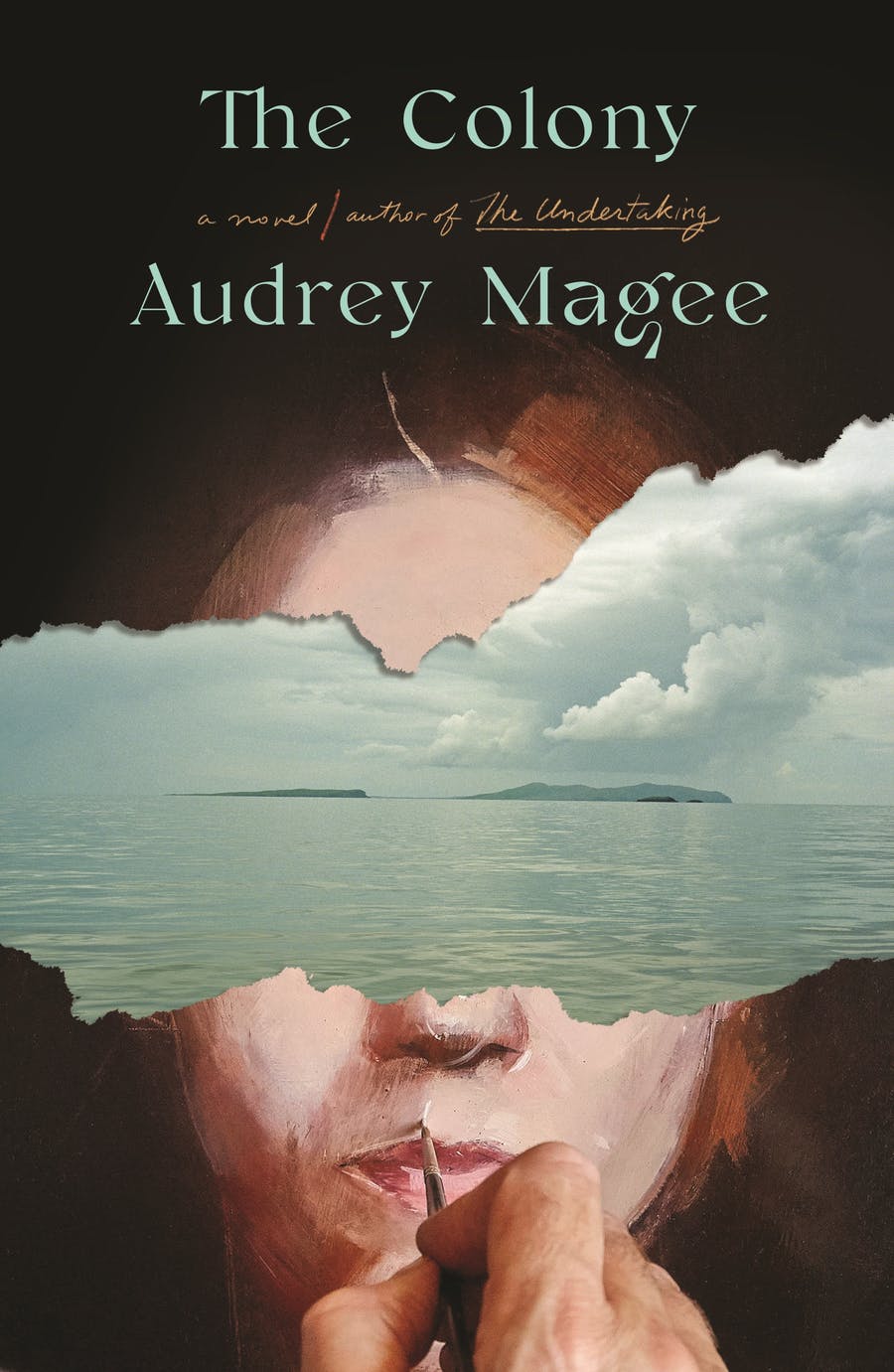He saw the boat on the horizon and headed down towards the cove, although he had nothing to collect, no reason to join the islanders already gathered on the slipway, the women in summer dresses and cardigans, hair tidied, lips coloured, shoulders straightened, standing upright among the old men sucking on pipes, lips smacking against each other, the small sound audible to him in the cove raucous with sea and birds.
self-portrait: acclimatising
self-portrait: becoming an islander
James stood by the water’s edge. He nodded at the artist.
Busy day, Mr Lloyd.
So it seems.
Lloyd leaned against the cove wall, against the lichen and barnacles, and watched the scene unfold.
island series: arrival of the mailboat
He drew the islanders, the cove, the mail boat, the sea, then Mairéad, a shimmering green scarf in her hair, the fabric tum bling into her auburn curls, then himself, sketching himself sketching them.
self-portrait: with the islanders and the mailboat in the cove
self-portrait: company without obligations
self-portrait: contentment
The islanders began to wave, harder as the boat drew nearer, as they saw that a man at the prow, tall and tanned, was waving at them.
island series: the islanders’ welcome
The man, his hair bleached by sun, jumped off the boat and into the water, still in the sea as he shook men’s hands and kissed women’s cheeks, first left, then right. He tousled the boys’ hair and swung the girls into the air, laughter reverberat ing around the cove. Lloyd pressed his back against the lichen and barnacles and sidled along the cliff, away from the gather ing, from the excitement.
self-portrait I: not for me
self-portrait II: not for me, the englishman
The man, still in the water, walked towards Lloyd. He stepped onto the slipway, spilling seawater over the concrete. He reached out his hand.
So you’re the Sasanach?
I’m sorry?
The Englishman. That’s what they call you.
Is that a compliment?
Depends on the politics, I suppose.
They shook hands.
I am Jean-Pierre Masson.
You’re French?
Yes. Paris.
This is a bit of a change then.
Masson shrugged.
I come every summer.
An unusual place to holiday, said Lloyd.
I could say the same of you.
I’m not on holiday.
Nor am I, Mr Lloyd.
Masson led the islanders back up the path, singing in French as he went, the girls spinning and skipping behind him, the women giggling and leaning into each other, Mairéad among them. Lloyd followed, walking behind with the old men, trailing them into the kitchen where the table was covered with apple tarts, rhubarb tarts, fruit cake and scones, the jam and cream set out in decorated bowls and the milk poured into small jugs. Bean Uí Néill seated Masson at the head of the table, but left Lloyd to find a place of his own. He sat halfway down the table, close to Micheál. Bean Uí Néill poured tea while Mairéad offered scones. Lloyd took one.
Thank you, he said.
He cut it open and ate it without jam, without cream.
How long will you be here, Mr Masson?
Call me JP.
I’m happy with Mr Masson.
Suit yourself.
So, how long will you be here?
Three months. And you?
About the same.
I love it here, said Masson. It’s my fourth summer, you know.
Lloyd turned away, towards Micheál.
Quite a party here today, said Lloyd.
There always is when JP arrives, said Micheál.
So I see.
And how are you getting on, Mr Lloyd?
Well enough, thank you. James is looking after me.
I hear that Bean Uí Néill is in a rage with you.
I’m sure that it will pass, he said.
Micheál smiled.
Don’t count on it.
Lloyd nodded at the old woman in the corner, to the side of the fire. She lifted her hand towards him.
Dia dhuit, Mr Lloyd.
Hello.
She was older than the old men, though the skin on her face was softer, the fissures less pronounced, the pale creaminess of her cheeks fragmented by tiny capillaries burst open by
wind
pin tip
red paint
across
rich cream
after rembrandt
The Frenchman was taking gifts from his bag, boxes of chocolates wrapped in silver paper and blue ribbon. Lloyd looked down at his hands and rubbed charcoal from his fingers
not here
to ingratiate
to please
here
to paint
He rubbed at his knuckles, his head down but his eyes turned to watch as Masson moved around the room distributing chocolates and kisses to the women, lingering with Mairéad, auburn hair and shimmering green drifting down her back, laughing as she thanked him. Masson sat down again.
Such wonderful people, he said.
You speak the language, Mr Masson?
Yes, I study Irish. Gaelic, as you prefer to call it.
I have no preference.
Then we’ll go with Irish.
Masson drank from his cup.
I’m a linguist, Mr Lloyd, and I specialise in languages threatened with extinction.
And you’re here to save Gaelic?
Masson returned the cup slowly to its saucer.
I want to help, yes.
How can you help a language that is almost dead?
I’m writing a book.
Lloyd stretched his arms into the air, right, then left.
I suggest that you and your book are fifty years too late, Mr Masson.
Yes, that is what the speakers of English like to believe.
And what do the French think, Mr Masson?
That Irish is an ancient and beautiful language worthy of our support.
Lloyd lifted his cup for more tea.
The young people want English, Mr Masson.
Young people want many things, Mr Lloyd.
Bean Uí Néill poured tea.
Languages die, said Lloyd, because the speakers give up on them.
That can be a contributing factor, yes.
Isn’t that then the speakers’ choice? The freedom of their will.
That choice, that freedom, is often more curtailed and complicated than you might think.
Is it? I abandon Irish because English is more advantageous to me. I can get a better job, travel further.
As I said, it is more complicated than you suggest.
Masson sat back into his chair.
And what type of art do you do, Mr Lloyd?
Landscape. I am here to paint the cliffs.
Ah, another painter who wants to be Monet.
That’s rather rude.
Isn’t every cliff painter trying to emulate Monet?
I am not trying to emulate anybody. Least of all Monet.
Masson took the scone offered by Mairéad.
I imagine Monet is too genteel for you, Mr Lloyd. Too subtle.
Too boring. Too nice. Too bourgeois. Too bloody French.
Masson sighed.
How do you do that? said Masson. Do what?
Paint what another artist has done so definitively?
How can you write yet another book about the demise of Gaelic?
My book is different.
My art is different.
Micheál stood up.
We should sort you out, JP. Get you settled.
Where are you staying? said Lloyd.
Micheál pulled on his cap.
He’ll be beside you, Mr Lloyd.
Lloyd ran his hands along his thighs, flattening the green corduroy of his trousers.
I paid to be on my own.
You’re on your own, Mr Lloyd. You have a whole house to yourself.
I paid you to be alone here.
You rented the cottage, Mr Lloyd. Not the island.
Masson stood up. He picked up his bag and pointed at Lloyd.
And I should have been told about him.
What about him, JP?
An English speaker on the island, Micheál.
English speakers come to the island all the time, JP.
Not for three months.
Everyone is welcome, JP. Whatever language you speak.
Masson shook his head.
That’s the problem, Micheál, that’s why the language is dying.
He left. Micheál followed, and the room emptied, the tea party at an end. Lloyd stayed on, sipping at his already cold tea, but then left. The women flopped onto the emptied chairs, into their own language.
That went well, said Mairéad.
They laughed, cursorily.
They’ll be best friends by the end of the summer, said Francis.
Bean Uí Néill tugged at the ribbon and opened the chocolates decorated with pink and blue sugars, chocolate flakes and tiny fragments of nut.
They are very beautiful, she said. It’s almost a shame to eat them.
She popped a round white truffle into her mouth.
I’m saving mine, said Mairéad.
For what? said Francis.
Until I’m ready.
Ready for what? You either want a chocolate or you don’t.
There’s the moment, Francis.
Here she goes. What moment, Mairéad?
The moment when they’re all gone. If I don’t eat them, I save myself from that moment.
Nothing is straightforward with you, is it? Not even a bloody chocolate.
She shrugged.
Some things are, Francis.
Bean Uí Néill sent the chocolates down the table towards her mother, Bean Uí Fhloinn. The old woman shook her head.
Too sweet for me.
Bean Uí Néill took a second chocolate and closed the box.
So, are we ready for a summer of these two men? It’ll be pure entertainment, said Mairéad.
Will it? said Bean Uí Néill.
A spectacle, Mam.
I don’t like it. Two foreigners at the same time.
Just sit back and watch, Mam. Enjoy it.
They’ll be at each other all summer, said Bean Uí Néill.
Battle of the ego, said Francis. France versus England.
They think they own the place, said Bean Uí Néill.
Nothing new there, said Francis.
Bean Uí Néill sighed, loudly.
I don’t like having two of them.
It’s not that bad, Mam.
It is. I’ve enough English to know.
Ah, they’re just being stupid, said Mairéad.
Well, I don’t like it.
It’ll be grand, Mam.
No, Mairéad. One is grand. Two is more than we can manage.
It’s only a bit more cooking and cleaning, said Mairéad.
Bean Uí Néill shook her head.
I don’t like it. Don’t want it.
It’s just after the quiet of the winter, Mam. You’ll get used to it.
No. I won’t. And I don’t like that Englishman drawing James.
Ah, Mam. Not that again. They’re having a bit of fun together, that’s all.
Francis lifted his cup. Bean Uí Néill poured tea for him.
Your mother is right, Mairéad. He shouldn’t be drawing James.
Leave it, Francis. Nothing to do with you.
I’m his uncle.
Mairéad opened her chocolates, ate one, then a second. And a third.
We’ll get used to them, Mam, said Mairéad. They’ll get used to each other.
I don’t like it.
And we need the money, Mam.
We do, Mairéad. Especially when that son of yours refuses to fish.
Mairéad stood up. She scraped the jam back into the jar and gathered the remaining cream in a bowl.
I’ll use that for butter, she said.
Bean Uí Néill cut another slice of rhubarb tart for Francis. She added cream from the bowl.
I wonder how Micheál’s getting on, she said.
I’d say they’re giving him hell, said Francis.
Well, he deserves it, said Bean Uí Néill. Taking their money and lying to them.
Ah, now, said Francis. He didn’t lie.
He did, Francis.
More just that he didn’t fully inform.
They laughed.
He should have told JP that the Englishman was coming, said Mairéad.
And risk three months’ money? said Francis. He’s not going to do that.
No, I suppose he’s not.
But he’ll skip away again tomorrow, said Bean Uí Néill, leaving us with his mess.
Ah, you’ll do well out of it too, said Francis.
Not as well as Micheál.
Nobody does as well as Micheál, Mam.
Mairéad gathered the plates and cups, wiped the table with a damp cloth and carried the dishes into the back kitchen. She made fresh tea and sat again at the table. She poured tea for Bean Uí Fhloinn.
What do you make of it all, Bean Uí Fhloinn?
The old woman rapped her fingers against the wooden arm of her chair.
Truth is elusive when money is in the room.
Mairéad laughed and patted the old woman’s shoulder.
It is that, Bean Uí Fhloinn.
It’ll be a strange summer right enough, Mairéad.
The old woman sipped from her cup.
Ah, you love JP, Bean Uí Fhloinn.
I do. And we know him well enough at this stage. Know the routine of what happens when he’s here.
We do, said Bean Uí Néill. And we enjoy it.
Mairéad passed tea to her mother, to Francis.
But we don’t know about him and this Englishman, said Bean Uí Fhloinn. That’s new for us. Something we don’t know.
So what do we do, Mam? said Bean Uí Néill.
Let Micheál do the running for the minute, said Bean Uí Fhloinn, and then we’ll see.
They drank tea and waited in near silence until Micheál returned.
Well? said Mairéad. What happened?
The Sasanach wants to move. Says that he wants a more isolated house with better light.
And what did you say?
I told him that short of uprooting the house and taking off the roof, there was nothing I could do for him.
They laughed.
And JP? said Mairéad.
Fine, until he discovered that he was sharing a turf pile with Lloyd.
What’s wrong with that?
That was the end of him, ranting that he doesn’t want to be anywhere near an English speaker. ‘I am here for the Irish language,’ he said, ‘I need full immersion.’
What did you do?
I threw him into the sea, Mairéad. Full immersion.
They laughed again. Mairéad poured tea for him.
Seriously, what did you do?
I had to split the pile in half. One side for JP, the other for the Sasanach.
Imagine that, said Mairéad. A Frenchman and an Englishman squabbling over our turf.
They’ve been squabbling over our turf for centuries, said Francis.
I suppose they have.
He leaned into her, whispered to her.
You’d like that, Mairéad, wouldn’t you?
Like what?
Being squabbled over.
She pushed him away.
No, I wouldn’t, Francis.
Bean Uí Néill stood up.
Right, we have a meal to make. Out, the lot of you.
Mairéad took the scarf from her head, tied her hair into a bun and went into the small backyard to gather turf, hurrying her task as Lloyd and Masson were already outside, on the other side of the wall, throwing clumps of turf into fraying baskets, backs and buttocks against each other, Lloyd working quickly but clumsily, Masson slower and more meticulous in his movements, still bent at the task when Lloyd declared himself finished and picked up his half-filled basket to return to his cottage. He slammed the door, bolted it and shouted through it at the Frenchman.
Go to hell, he said.
Masson clicked his tongue.
Quel mec, he said.
He continued to fill his basket, gathering for himself the clods scattered about the dividing line drawn into the dust by the heel of Micheál’s boot.
Quel idiot.
His basket full, he dropped it at the back door of his cottage and walked across the concrete to the lean-to, propped against the toilet house, where he found the sweeping brush that he used every year to clean the yard, the bristles worn, the wood weathered, the top of the handle broken and splintering. As it was, he said. As it always has been. He began to sweep, tidying the yard as he did at the start of every summer, gathering turf scraps, dust and dirt. A dog settling into its basket, he said. He brushed along Micheál’s line but not over it, each stroke further dividing the concrete yard, light grey on one side, dark grey on the other. Swept. Unswept. Clean. Dirty. He picked up the turf straddling the dividing line and threw it into his basket. Mine, Lloyd, for I was here first. The whole yard is mine. Always has been. And damn you, anyway. For being here. For intruding. Damn you too, Micheál. For not letting me know. For taking my money, more money than last year, without telling me that he would be here. An Englishman. In this, my final summer. He shouldn’t be here, not on this island, not in this yard, for this is my place, my retreat, where I sit, alone, at the end of the day, hidden by the whitewashed walls from the rest of the island, from the islanders, the evening sun on my closed eyes as I dissect the day’s language and analyse the phrases and inflections, the intonations and borrowings, hunting for influences of English, for traces of that foreign language creeping onto the island, into the houses, into the mouths and onto the tongues of the islanders, tracking those tiny utterances that signal change, marking the beginning of the end of Irish on the island, these thoughts, this knowledge, encased and protected by the smallness and stillness of this yard, with only the birds to hear my mutterings, as it was in the wood-panelled courtyard of my grandmother’s house on the edge of the village far from the town, further still from the city, sitting on my own at the circular table cast of iron, under the willow tree, the birds above me, around me, witness to my childhood mumblings on those early summer mornings, my parents, my aunts, my cousins still sleeping, my grandmother in the kitchen, humming as she prepared my hot chocolate, a freshness and softness to her movements that would later, as the day aged, become irritated and hardened, but then, in the early morning, as I sat outside, alone in the courtyard, as she stirred the chocolate powder into the warm milk, she was gentle, smiling as she set the blue and white bowl in front of me, smiling still when she returned from the kitchen with a basket of bread, with butter and jam, with a teaspoon, a knife, a napkin and a glass of water, setting them all in front of me, ruffing my hair, telling me how happy she was to see me again, to have me to stay, and I, aware even then of the transience of our intimacy, kissed her hand, her skin not yet old but beginning to grow old, holding her until she pulled away and returned to the kitchen, her slippers slapping the tiled floor still to be warmed by the day’s sun, leaving me alone again with the birds. As it had been here. As I had been here. Alone, in this yard, until now, until the arrival of this Englishman with his English talk. Masson lifted the brush and slammed it against the concrete. Damn you, Lloyd. This yard is mine. It will be impossible for me to sit out here, to consider the day in silence because you’ll be there, next door, making noise, and, worse than that, speaking English, an arrogance that I now have to incorporate into my work because your presence influences the outcome, the findings, undermining everything I have done, and I resent that, Lloyd, resent your arrogance, your intrusion, your dominance, your upending of the years that I have spent chronicling the demise of this language, years of cold summers in a damp, mildewed cottage that I scrub and bleach only to watch the blackness return as I sit at the kitchen table picking over slight linguistic shifts in this ancient, dying language, tracking tiny but significant movements from one summer to the next to prove a generational incorporation of English into Irish, a gradual but noticeable shift towards bilingualism, eventually, I imagine, to monolingualism, but gradual, Lloyd, do you hear me? A linguistic evolution that was occurring slowly until you turned up to destroy my work because the shift now to English will be sudden and violent, more in keeping with the linguistic history of Irish towns and their hinterlands than with a remote island. The Irish here was almost pure, Lloyd, tainted only by the schoolchildren learning English, by the intermittent visits of emigrants returning from Boston and London with their sophisticated otherness, and by mercenaries in linguistic mediation, men like Micheál who want only to communicate, indifferent to the medium or its need for protection until it one day dawns that the loss of Irish and the rise in English reduces his capacity to earn, to be the man in the middle, the broker, he who can shrug his shoulders and claim misunderstanding when the yard that has always been mine is taken from me without notice or discussion, when an Englishman moves in beside me, without notice or discussion, Micheál the Middleman indifferent as he destroys five years of my work, no, more than five, as it took me so long to find this island and to learn their version of Irish, but he is indifferent because he is earning from it, fattening his wallet, improving his lot at my expense, at the expense of my work.
Masson reached under the overhang of turf with the brush to gather more dust and debris, and collected his sweepings into a pile. He returned to the lean-to to collect a shovel encrusted with cement and heavier than it should be. He tilted the shovel and brushed up the sweepings, though dust slipped underneath as the lip was too high and too uneven, leaving him again to wonder, as he did every year, whether he should have brought dustpans and brushes for the island women, for Bean Uí Néill and Mairéad who scoop their sweepings onto scraps of cardboard or onto the small black shovel that they use at the grate, cursing as they scatter fire dust over the already swept floor, but decided again this year against it, opting for the chocolates, even though they were more expensive, as he was on the island to observe rather than influence, to take note rather than change. Masson lifted the shovel and threw the dust and dirt over the Englishman’s pile of turf.
He heard James then, shouting, in English.
Tea is ready, he said.
James knocked on his door and went into the studio.
It’s on the table, Mr Lloyd.
Lloyd continued painting.
You can bring it here, thank you.
James fiddled with the handle of the door.
I can’t do that, Mr Lloyd.
You do it with my breakfast. That’s different.
There’s no reason why it should be. I pay you all enough.
The boy turned to leave.
Just bring my dinner here, James. I can’t, Mr Lloyd. Not allowed. Who says?
My grandmother. You’ll have to talk to her.
Lloyd sighed, slowly.
I’m already in her bad books.
You are, Mr Lloyd.
He wiped the wet paint from his hands.
So it’s go with you or starve.
That’s it, Mr Lloyd.
Will that dreadful Frenchman be there?
There’s nowhere else to eat.
Is Micheál still here? He is.
That helps.
Francis is too, said James.
That is of less assistance.
Lloyd picked up his hat and coat.
I’ll go to the cliffs after dinner.
It looks like rain.
Then I’ll get wet.
Don’t forget to fix your fire, Mr Lloyd.
I’m past caring, James.
The men were already eating when Lloyd sat down. Bean Uí Néill placed a plate of food in front of him, fried mackerel, mashed potato and cabbage.
The ubiquitous cabbage, said Lloyd. Just like Paris.
Masson shrugged.
We’re not in Paris, Mr Lloyd.
That I had noticed.
He began to eat.
And you don’t mind?
I mind many things, Mr Lloyd.
You don’t mind eating this food.
I didn’t come for the food, Mr Lloyd.
That was wise.
Lloyd pushed his fork at the food, at the mackerel swimming in oil that was not its own, at the potato that was still lumpy, at the insipid cabbage too long boiled in water. He sighed and mashed the fish into the potato, and added the cabbage, pressing his fork onto the food until the three ingredients blended and glistened with fat. He lifted the mixture to his mouth
body of fish
into body of man
cold flesh
cold fat
congealing
tongue and teeth
congealed
He swallowed and retched
discreet
well-mannered
good man lloyd
He returned his fork and knife to the plate, uncertain of how to continue, even though he was hungry and the food looked and tasted as it did on other evenings. He pummelled the mixture again and added salt and dusty white pepper. He shovelled the food into his mouth and swallowed
no tasting
no thinking
good man lloyd
He cleared his plate and looked up and down the table, the islanders mesmerised by Masson’s narrative, the Frenchman speaking in their language but using the facial gestures and hand movements of his own language.
self-portrait: outsider
He picked at the paint on his hands, peeling off strips of blue and grey, picking at splashes of white, his head bent, focused on the task, on the growing pile of paint scrapings on the table. Micheál was speaking, calling to him. He looked up.
Mr Lloyd, do you want us to speak English for you?
That would be nice.
Masson shook his head. He continued to speak in Irish.
This is an Irish-speaking island, he said.
With an English-speaking visitor, said Micheál.
It’s his choice to come here.
And we’re delighted to have him.
He chose to come to an Irish-speaking island.
We speak English too, JP.
Is that what you told him, Micheál? To persuade him to come here.
Micheál switched again to English.
JP is very passionate about the Irish language, Mr Lloyd.
Masson turned too to English.
Micheál is not, he said.
It’s my language, JP. I can use it as I please.
What about Mairéad and Bean Uí Néill? said Masson.
What about them?
They don’t speak English.
They understand more than you think, said Micheál.
It’s their house, said Masson. And they speak Irish.
As I said, they’ll be grand.
Bean Uí Néill set an apple tart on the table.
You are killing your own language, said Masson.
She cut into the tart, hitting the knife against the plate.
Irish is stronger than you think, said Micheál.
It is weaker than you believe, Micheál.
Micheál shrugged.
Than you like to believe, JP.
Bean Uí Néill served Lloyd first, and poured tea for him
grace
and
favour
mine today
It’s theirs to kill, said Lloyd. Not yours.
Masson shook his head.
You can’t speak on this. You have spent centuries trying to annihilate this language, this culture.
Lloyd stuck his fork into his tart. He ate two pieces and drank some tea.
France is no better, said Lloyd. Look at Algeria. At Cameroon. At the Pacific Islands.
You’re deflecting.
Lloyd shrugged.
This is about Ireland, said Masson. About the Irish language.
And do the Irish have a say, said Lloyd, in your great plan for saving the language?
The English don’t, said Masson.
Artwork © Detail from The Cliff of Aval, Etrétat by Claude Monet / Google Art Project / Wikimedia Commons


This is an excerpt from The Colony by Audrey Magee, to be published on 3 February by Faber & Faber and by Farrar, Straus and Giroux on 17 May.








